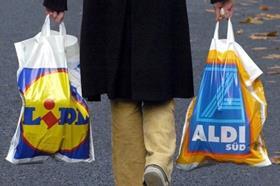
Aldi and Lidl have reached a combined10 per cent share of the British grocery market for the first time.
Grocery share figures from retail analysts Kantar Worldpanel for the 12 weeks ending 8 November 2015show thatLidl's market share reached a new record high of 4.4 per cent, increasing by 0.7 percentage points on last year thanks to a sales growth of 19 per cent, while Aldi grew sales by 16.5 per cent, keeping its market share at 5.6 per cent for the fifth consecutive month.
Looking back as recently as 2012, Aldi and Lidl only held a 5 per cent share of the market, and it had previously taken them nine years to double their combined share from 2.5 per cent.
In the last 12 weeks the two retailers have attracted another additional million shoppers compared with last year, while average spend per trip has increased by 4 per cent to £18.85, which is 78p ahead of the total retailer average.
A Kantar spokesperson said: 'The discounters show no sign of stopping and with plans to open hundreds of stores between them, they'll noticeably widen their reach to the British population.'
Despite high-profile Christmas advertising campaigns being launched by supermarkets in recent weeks, the overall market remains slow. Sales were only up by 0.5 per cent, held back by persistently falling prices, which remained down by 1.7 per cent on a like-for-like basis.
Sainsbury's has seen its fourth consecutive period of growth, flying in the face of tough market conditions. Its 1.5 per cent increase in sales was sufficiently ahead of the market for the retailer to increase its share by 0.2 percentage points - the first share gain registered by any of the 'big four' retailers since October 2014.
The Kantar spokesperson added: 'Sainsbury's performance means it has once again regained its position as Britain's second-largest supermarket, pushing ahead of Asda in the latest 12 weeks. The food-focused retailer traditionally increases its market share over Christmas, so we can expect to see it keep hold of second place for the time being.
'Sales fell at the rest of the major retailers - at Tesco they were down by 2.5 per cent, while Morrisons saw sales fall by 1.7 per cent. With a raft of recent announcements including a range reduction and increasing click-and-collect opportunities in its stores, Asda will be looking to improve upon its decline of 3.5 per cent in the coming weeks.'
Growing revenues this quarter, meanwhile, were Waitrose and The Co-operative, where sales were up by 2.7 per cent and 1.5 per cent respectively. The Co-operative's market share gain of 0.1 percentage points to 6.3 per cent is its first year-on-year share gain since 2011, when the benefits of the Somerfield acquisition were still being felt.



